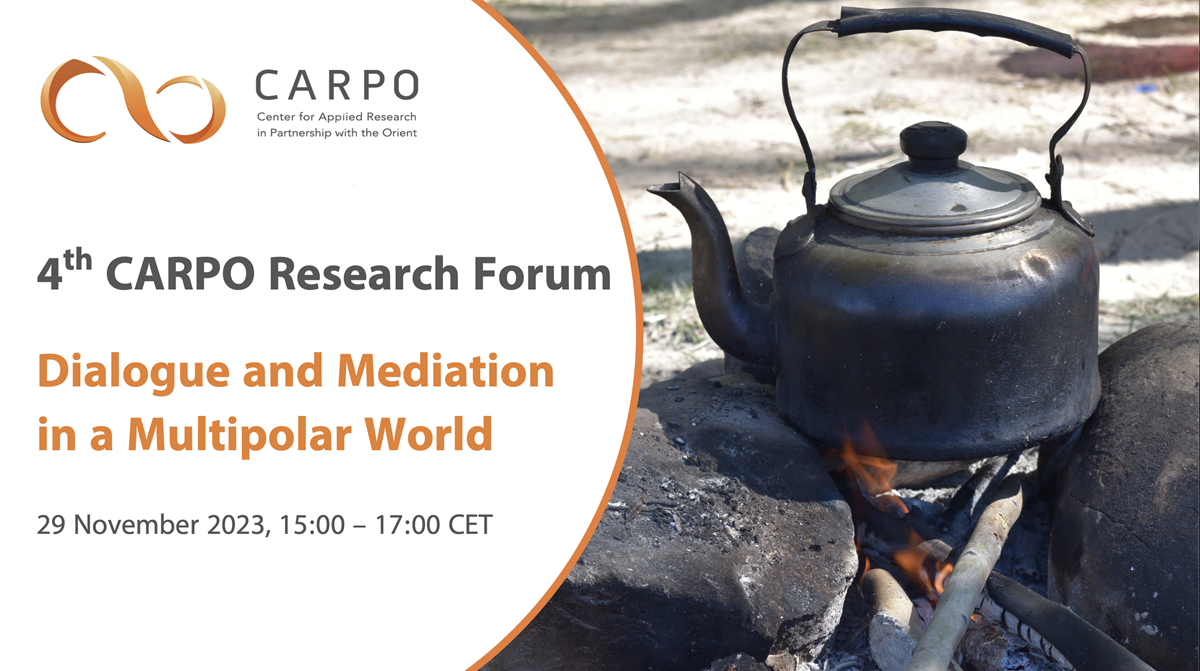
by Desirée Custers
The 4th edition of the CARPO Research Forum (CRF) was entitled “Dialogue and Mediation in a Multipolar World” and took place online on November 29, 2023. It brought together several renowned experts to discuss the role of dialogue and mediation in a global climate characterized by polarization and multipolarity. The deliberations were centered on what kind of impact these global trends may have on dialogue and mediation efforts. More specifically, the inputs by the experts addressed questions such as: what the merits and limits of dialogue are; how dialogue initiatives can lead to actual mediation efforts; and how the need for neutrality and balance can be reconciled with moral convictions.
The CRF started with a keynote speech by Peter Jones, Executive Director of Ottawa Dialogue, and was followed by a discussion with panelists Jamila Ali Rajaa, Co-Founder of Consult Yemen, Ibrahim Fraihat, Associate Professor in International Conflict Studies at the Doha Institute for Graduate Studies, Julia Pickhardt, Project Manager Yemen at CMI – Martti Ahtisaari Peace Foundation, and Oliver Wils, Head of Berghof Foundation’s MENA Department. The panel was moderated by Jane Kinninmont, Director Policy and Impact at the European Leadership Network.
Multi-track Dialogue and Mediation: a brief overview
Peter Jones began his keynote speech by outlining on how the field of unofficial diplomacy has developed over the past decades. While the idea of unofficial dialogues has been around for at least a century, Jones argued that track-2 diplomacy, as a form of dialogue, goes back to the mid-60s. The goal of track-2 diplomacy was designed to be ‘problem solving’ rather than ‘negotiation’. Jones elaborated that track-2 diplomacy was developed out of the recognition that elite-level dialogue alone was not enough to develop comprehensive peace. Instead, there would have to be attempts to bring people together on different levels. Eventually, this led to a multi-level approach for dialogue processes in which dialogue tracks are conducted separately while, at the same time, feeding into each other.
With the end of the Cold War and the introduction of the Agenda of Peace by Boutros Boutros-Ghali in 1992, peace processes increasingly stressed the need to broaden mediation and dialogue to include local actors, otherwise termed the ‘local turn’. Track-3 diplomacy, or, people-to-people diplomacy, also became increasingly important. However, it was mentioned during the CRF that track-3 is gradually becoming a space for advocacy for specific norms, solutions, and inclusiveness, rather than merely a support to the track-2 and track-1 dialogue levels. As a consequence, it was explained how dialogue streams on track-3 are beginning to separate and even become antagonistic to those on track-2 and track-1. The following discussion reflected on these developments and their possible implications in the fields of dialogue and mediation.
Examples from the field: challenges to dialogue and mediation
The speakers reflected on the different tracks existing in mediation processes for contexts such as Yemen and Syria, and past efforts between Iran and Saudi Arabia. It was noted that dialogue initiatives on the different tracks have not always fed into each other. Initiatives on the track-3 and track-2 levels continued to take place, while official diplomatic efforts had stranded. This, according to one of the discussants, can become problematic because solutions and creatives outcomes offered in the track-2 and 3 efforts may go nowhere if they are not supported by the official mediation efforts and fail to get political buy-in. Nevertheless, track-2 and 3 initiatives are necessary because they provide space for dialogue as a tool to think outside the box and beyond political constraints.
Another discussant pointed to the need for a contextualized approach when implementing track-2 and 3 dialogue initiatives. The dialogue approach for Iran and Saudi Arabia, for example, differs to a dialogue/mediation approach between parties, where a stark power discrepancy between the parties exists. In addition, another discussant emphasized the need to consider differences in how personal and professional relationships are made in varying cultural contexts. It requires different methods for trust-building and dialogue facilitation depending on the respective regional context. This is of paramount importance when thinking about dialogue and mediation efforts between actors in a multipolar world.
The discussants also reflected on the difficulties of tracing and measuring the results of track-2 and 3 initiatives, emphasizing that these are often long-term and indefinable. They, furthermore, cannot always be made explicit and public due to the confidentiality measures surrounding such initiatives. Confidence building and networking between participants, it was stressed, often happen at the margins of such dialogue processes, such as during coffee breaks, dinners, or a joint stroll outside the dialogue venue. This requires very precise observation and measurement to be able to assess the success of dialogue initiatives.
During the CRF, it was emphasized that dialogue remains evermore important in a world of not only multipolarity, but also of multi-polarisation. The polarization of narratives and opinions, too, takes place on different levels and is, thus, difficult to grasp fully. As practitioners of dialogue and mediation, there is, therefore, a need to think about how the traditional role of track-1 mediation on an official level can relate to initiatives on the track-2 and 3 levels, and how deliberations on the political level can be reconciled among different parties, but also along the three different levels outlined above. The discussants recommended for participants and facilitators to such mediation efforts to move between the dialogue different tracks to obtain a full picture. In addition to implementing partners, the discussants emphasized the need for donors of dialogue and mediation initiatives to be on board in bridging the different dialogue levels and support an inclusive approach towards dialogue and mediation.
CARPO Research Forum